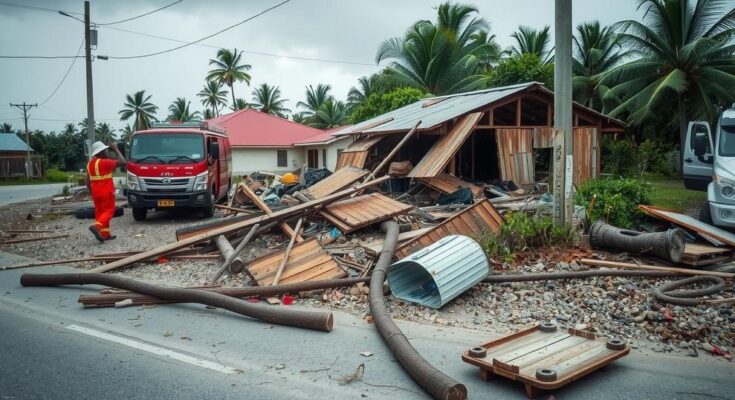Cyclone Chido has struck Mayotte, claiming at least 11 lives and injuring many more. Emergency assessments are ongoing as authorities fear the death toll may rise. The cyclone is reported as the worst to hit the territory in 90 years, causing extensive destruction and prompting concerns about the region’s vulnerability to extreme weather events.
The French territory of Mayotte has been severely impacted by Cyclone Chido, with the latest reports confirming a tragic death toll of at least 11 individuals. In addition to the fatalities, the French Interior Ministry highlighted that 246 others sustained injuries, including nine individuals in critical condition. The cyclone swept through the southeastern Indian Ocean, creating destructive conditions not only in Mayotte but also affecting nearby islands such as Comoros and Madagascar. The prefect of Mayotte noted that this storm is the worst cyclone to strike the region in nearly ninety years. Concerns remain regarding the final count of the casualties as rescue efforts continue amidst the widespread devastation.
In the aftermath of Cyclone Chido, French officials are mobilizing resources to assess the damage and provide assistance. At an emergency meeting in Paris, French Interior Minister Bruno Retailleau voiced apprehensions regarding the potential for an escalated death toll, stating, “fears that the death toll in Mayotte will be high.” This storm has left the local population grappling with recovery amidst the wreckage and disruption, further underscoring the vulnerability of island nations to extreme weather events exacerbated by climate change.
Mayotte, a small island situated between Madagascar and the coast of Mozambique, faces unique challenges in disaster management due to its geographical location. The territory is susceptible to cyclones and severe weather due to its position in the Indian Ocean, which has seen an increase in cyclone intensity and frequency attributed to climate anomalies. The humanitarian implications of Cyclone Chido are profound, as communities now confront the dual challenges of recovery from both loss of life and the destruction of infrastructure across the affected regions.
In summary, the unfolding tragedy in Mayotte is a stark reminder of the escalating impacts of climate change and the pressing need for enhanced disaster preparedness and response mechanisms. As authorities work to support those affected and restore essential services, the focus remains on the health and safety of the local population, with increasing scrutiny on disaster response frameworks in island territories prone to natural disasters.
There are no direct quotes provided from the original source aside from information surrounding the events discussed.
The official reports indicate at least 11 fatalities, significant injuries, and widespread devastation due to Cyclone Chido, marking it as a critical moment for Mayotte. The need for international and national support in the wake of this disaster is crucial to facilitate recovery and aid the affected population.
Ultimately, the situation in Mayotte serves as a critical reflection on the impact of climate change, the urgency for effective disaster response strategies, and the importance of international solidarity in the face of natural disasters.
Cyclone Chido has wreaked havoc in Mayotte, a French territory located in the Indian Ocean. Its path through the southeastern Indian Ocean not only devastated Mayotte but also extended its reach to the nearby islands of Comoros and Madagascar. This recent cyclone is recognized as the most destructive event in over 90 years for Mayotte, highlighting the increased frequency and intensity of tropical storms in the region, sparking discussions on climate adaptation and disaster preparedness.
In conclusion, the catastrophic effects of Cyclone Chido on Mayotte illustrate the dire need for enhanced disaster preparedness and response strategies in vulnerable regions. The rising frequency of climate-related disasters necessitates a collaborative international approach to bolster resilience and aid recovery efforts effectively. The loss of life and extensive injuries reported underscore the human toll of such natural disasters, reinforcing the urgent call for comprehensive climate action.
Original Source: everythinggp.com




